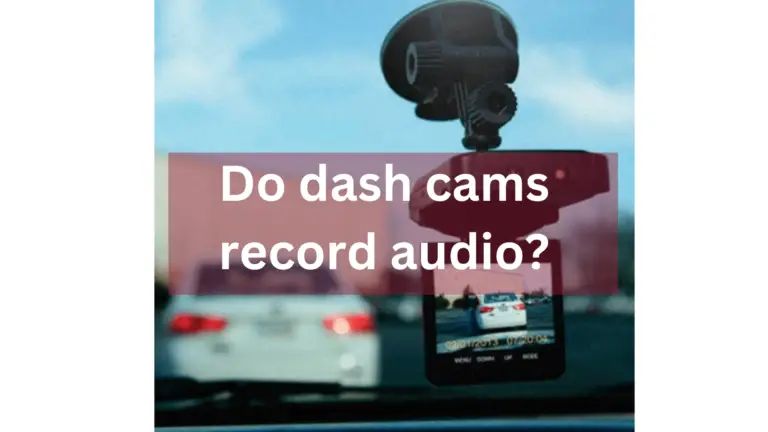Will the dash cam drain battery?
One of the most common questions people ask when purchasing a dash cam is whether it will drain their car battery. Dash cams are designed to provide evidence in the event of an accident, but some source must power them.
In this article, we will explore whether dash cams can drain your car battery and what measures you should take to prevent it.

Will the dash cam drain the battery?
If you’re considering buying a dash cam, it’s normal to worry about how much power it will use. After all, your car battery is essential for starting the engine and powering all of the electrical components in your vehicle.
The good news is that dash cams don’t actually require a lot of power, so you don’t need to worry about your battery getting drained. Most dash cams are designed with low-power consumption in mind.
They typically use a small amount of electricity to run, meaning they won’t significantly impact your battery’s overall performance. In fact, many dash cams are equipped with features that help them conserve power when not in use – such as automatic shut-off or sleep modes – further reducing their impact on your car’s electrical system.
However, it’s worth noting that some high-end dash cams with advanced features like WiFi connectivity or built-in screens may consume slightly more power than basic models. It’s also worth noting that modern vehicles are built to handle additional electrical loads without issue.
Where Do Dash Cams Get Power From?
Dash cams are gaining popularity as a reliable means of ensuring safety and security on the road. With the increasing demand for these devices, one question that often comes up is where they get their power from.
The two most common ways to power dash cameras are through a 12V power source or by hard wiring them into the car’s fuse box. Using a 12V power source is the easiest and most common way to power a dash cam.
The majority of dash cams come with a cigarette lighter adapter that can be plugged into the car’s 12V socket. This method requires no installation and provides instant power to the device whenever the car is on, which means recording can start automatically without any manual intervention.
However, one downside of this method is that it may clutter your dashboard with wires and cords. The car’s fuse box is an essential component of its electrical system, and houses a fuse that protects various circuits in the vehicle.
The box typically contains both standard blade-type fuses and mini blade-type fuses. The latter is commonly used in newer cars and can be identified by their smaller size. To hardwire a dash cam into the fuse box, you’ll need to identify which circuit you want to use for power and connect directly to it using an add-a-circuit device.
What can drain a car battery when the car is off?
Car batteries are an essential component of modern vehicles, powering everything from the starter motor to the radio. However, there are a variety of factors that can cause your car battery to drain even when your vehicle is switched off.
One of the most common culprits is interior lights that have been left on after you have exited the car. While these may seem like a small inconvenience, they can slowly but surely sap power from your battery over time.
Another factor that can contribute to car battery drain is door lights that don’t turn off automatically when you close the door. This often occurs when one or more of the door sensors is faulty or has been damaged, leading to increased power consumption and eventual battery depletion.
In addition to these two culprits, bad relays can also cause excessive battery drain in some cases. Relays are electrical switches that allow power to flow from one circuit to another. In some cases, a bad relay can cause a drain on your car battery, even when the ignition is off.
This happens because the relay doesn’t fully disconnect and continues to draw power unnecessarily. The worst part about a bad relay is that you won’t know there’s an issue until your car fails to start one day.
Frequently Asked Questions:
Does Hard wiring Dash Cam Drain The Battery?

No! Hard wiring Dash Cam does not drain the battery. Hard wiring your dash cam can actually save your car’s battery life. Most modern dash cams come with a hard wire kit that lets you connect the camera to your car’s power source instead of relying on its built-in battery.
Hard wiring a dash cam allows it to start recording as soon as you turn on the ignition and stop recording when you turn off the engine without any manual intervention. This way, even if you forget to turn off the camera after parking, it will automatically switch off once the ignition is turned off, eliminating any worries about draining your vehicle’s batteries.
Moreover, hard wiring also eliminates the need for charging or replacing batteries frequently. You don’t have to worry about running out of battery while driving or missing an important event because of a dead camera battery.
How Much Power Does A Dash Cam Use?

Most dash cams typically consume between 6-10 watts of power during operation. The amount of power a dash cam uses can depend on several factors. For example, if your dash cam has a built-in screen for viewing the footage, it will require more power than one without a screen.
Depending on your usage frequency, this wattage range can determine how often you need to recharge your device or connect it to an external power source using a USB cable or car charger. Additionally, if you leave your dash cam running continuously, it will use more power than if you only turn it on when you need it.
Some high-end models come equipped with built-in batteries that can last for several hours without needing to be charged, while others rely solely on external power sources. Despite the variations in power usage among different models of dash cams, most fall within the 6-10 watt range.
Conclusion:
Dash cams are beneficial for drivers and can provide a level of protection and peace of mind that is often hard to find. It is important to consider the impact it will have on your vehicle’s battery, as this can be affected by how long the dash cam runs for and how frequently you use it.
Ultimately, regular maintenance and care can help ensure that your car’s battery life isn’t significantly impacted by having a dash cam installed.
Related Posts:
What Is Wdr On The Dash Cam? ( How To Use It? )
How To Hide Dash Cam Wires? ( Simple & Easy Ways )
Is A Dual Dash Cam Worth It? ( Reasons & Pros )



